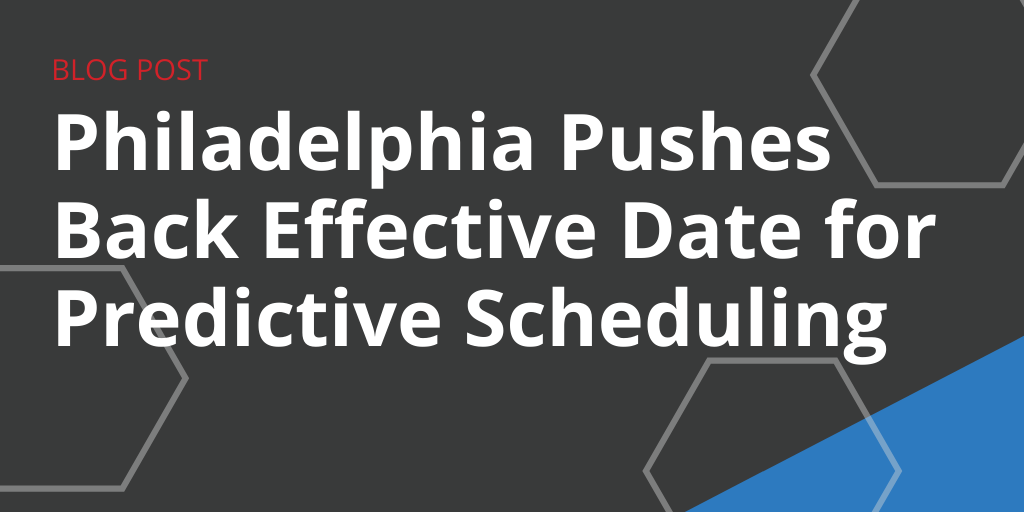LABOR LAW NEWS
Philadelphia Delays Effective Date for Predictive Scheduling Law
By Kris Janisch
Published Dec. 10, 2019

The effective date of the Philadelphia Fair Workweek Employment Standards Ordinance was initially set for Jan. 1, 2020.
Employers in Philadelphia have more time to prepare for the city’s predictive scheduling ordinance, which has been delayed until April 1, 2020.
The effective date of the Philadelphia Fair Workweek Employment Standards Ordinance was initially set for Jan. 1, 2020. But due to “the short amount of time between the anticipated posting of final regulations” and the original effective date, it was pushed back, according to the city.
Background
In December 2018, the city approved the ordinance, which will require employers in certain industries to give workers advance notice of their schedules, among other measures.
The city held an open comment period from Oct. 4 to Nov. 4, and the Mayor’s Office of Labor is now developing a report to address those concerns. That report is expected to be completed later this month.
Related: Predictive Scheduling Info for Employers This Holiday Season
Predictive Scheduling in Philadelphia
The ordinance applies to companies in the retail, food and hospitality industries with 30 or more locations nationwide (including franchises and chains) and 250-plus employees, which includes part-timers.
Among other items, the ordinance requires:
- Advance notice of work schedules (14 days)
- “Good faith” estimates of average work schedules (not enforced until July 1, 2020)
- Alerting an employee about potential on-call hours
- Prompt notice of schedule changes
- Ability for employees to decline hours not part of the posted schedule
- A minimum of nine hours between shifts
- Existing employees to be able to take available hours before new hires are made
- Employers to allow workers to request a schedule change without fear of retaliation
- Recordkeeping and posting obligations
The ordinance does not cover independent contractors, and employees covered by a collective bargaining agreement may waive the requirements.
Meanwhile, violations of the law can result in fines against employers.
Predictive Scheduling Nationwide
In 2017, Oregon became the first state to pass a predictive scheduling law, with cities now following the lead.
With the arrival of the holiday season, employers may be taking on additional workers and should check whether they are following local predictive scheduling laws. While Philadelphia’s is on hold for now, these cities also have ordinances on the books:
- New York City
- Seattle
- San Francisco
- San Jose, Calif.
- Emeryville, Calif.
Also note that Chicago recently passed its own predictive scheduling ordinance, but it won’t go into effect until July 1, 2020.
On the other end of the spectrum, some states have passed laws banning cities from passing such laws:
- Tennessee
- Iowa
- Georgia
- Arkansas
Conclusion
While Philadelphia employers won’t have to worry about predictive scheduling starting in 2020, other employment laws across the country will go into effect Jan. 1.
From minimum wage increases to paid leave laws and others, the world of employment law continues to shift and evolve. Companies would be wise to review all local laws where they have workers.
This Labor Law News Blog is intended for market awareness only, it is not to be used for legal advice or counsel.
Keep Informed
with GovDocs Labor Law News
Who is GovDocs?
GovDocs simplifies the complexity of employment law management (ELM) for large, multilocation employers across all industries. We offer a suite of innovative compliance products, including labor law postings, data software applications and other program management tools, to ease the day-to-day responsibilities of human resources, compensation, legal and finance teams.
Have less than 30 locations?
The GovDocs Poster Store simplifies the complexity of posting compliance for employers with less than 30 locations across all industries. We offer a variety of posting products to meet your labor law compliance needs, including federal and state posters; county and city poster packages; and other HR posters. Plus, when you purchase posters with GovDocs Update Service, you ensure your locations automatically receive updated posters whenever changes occur.


